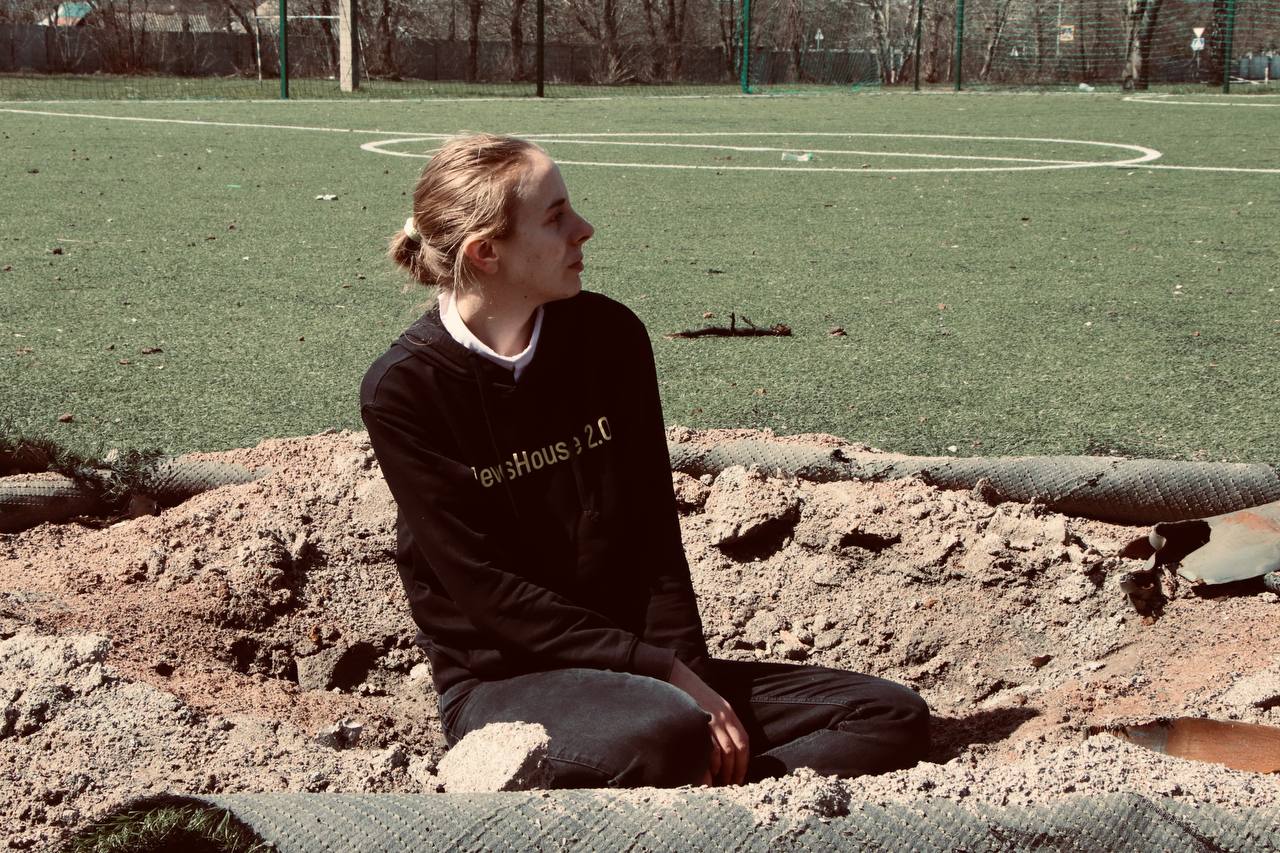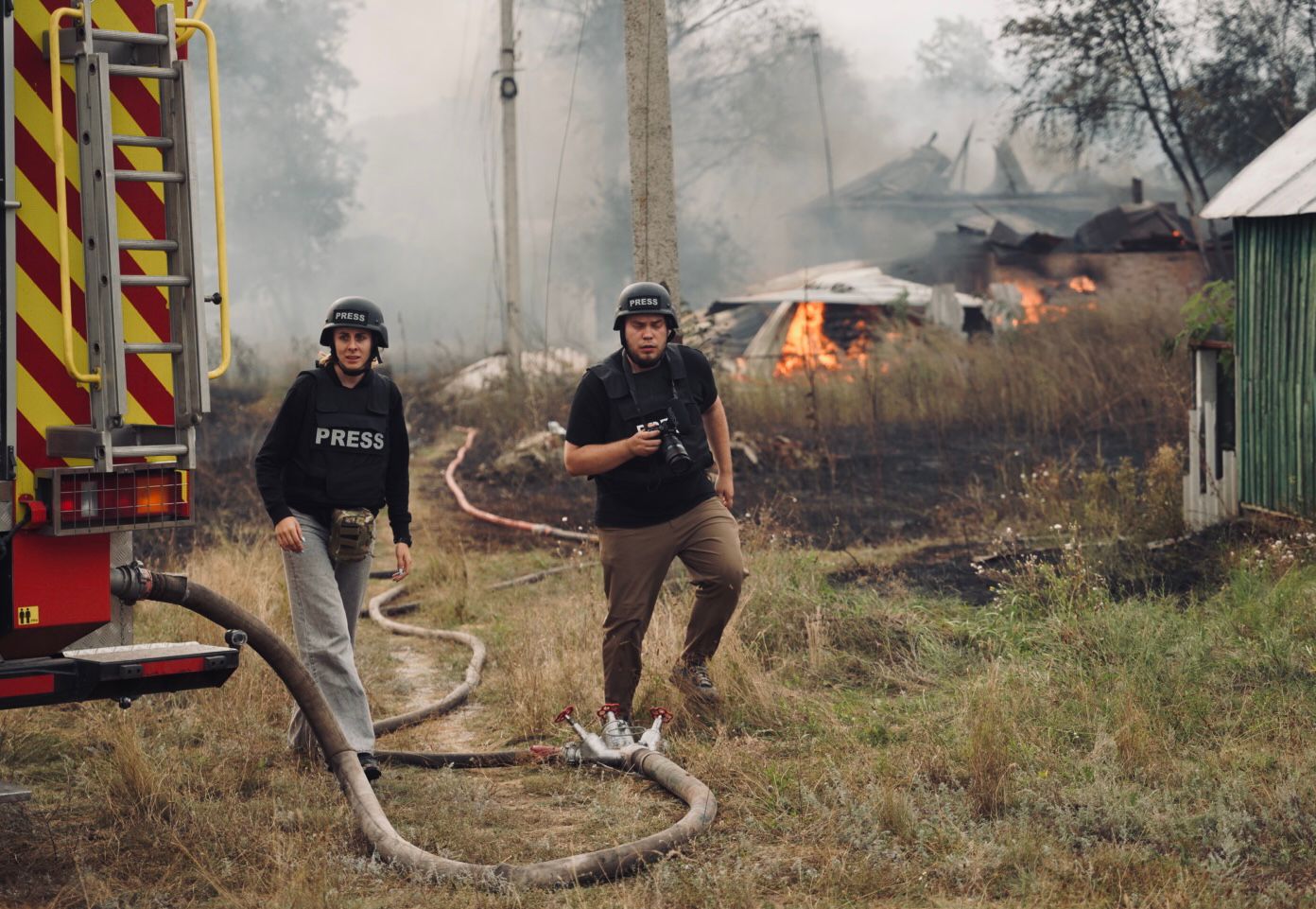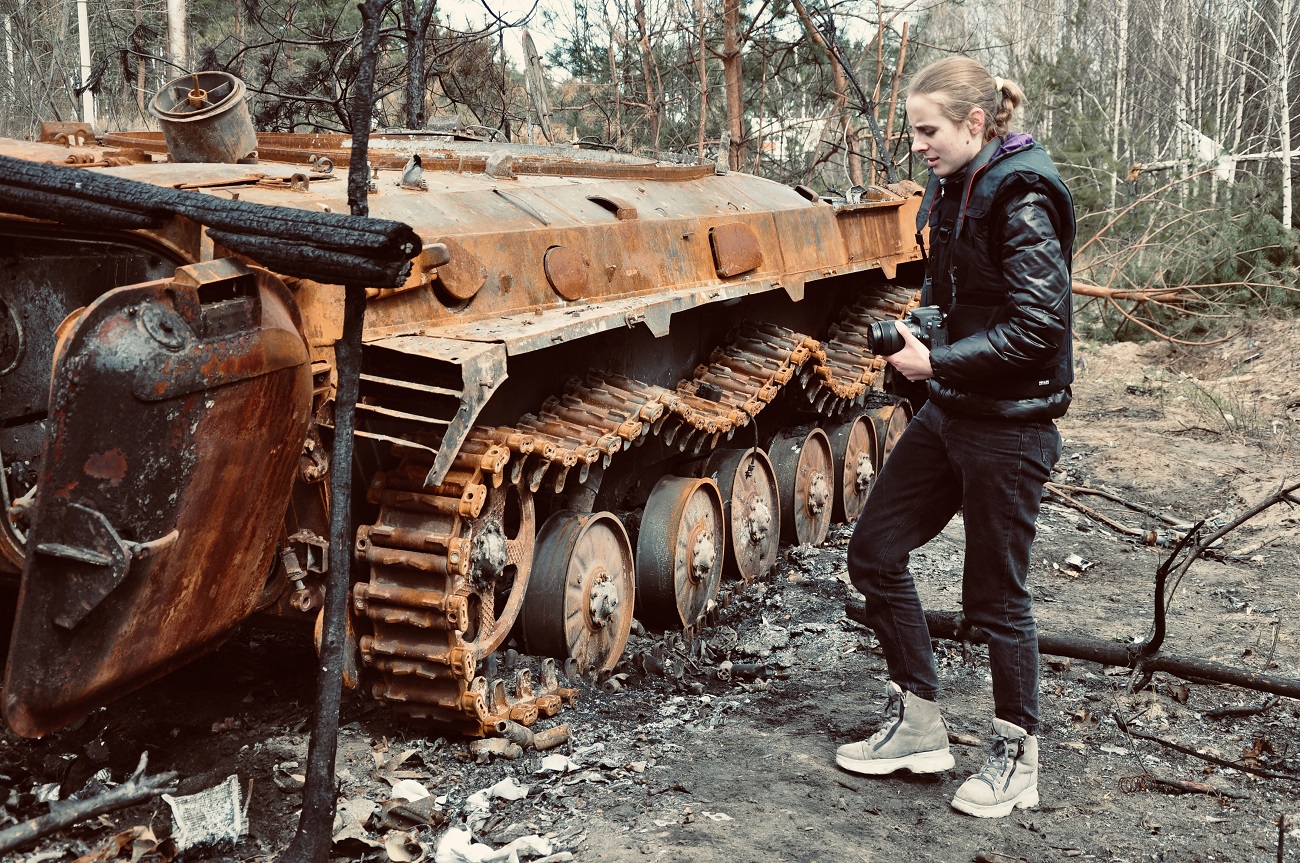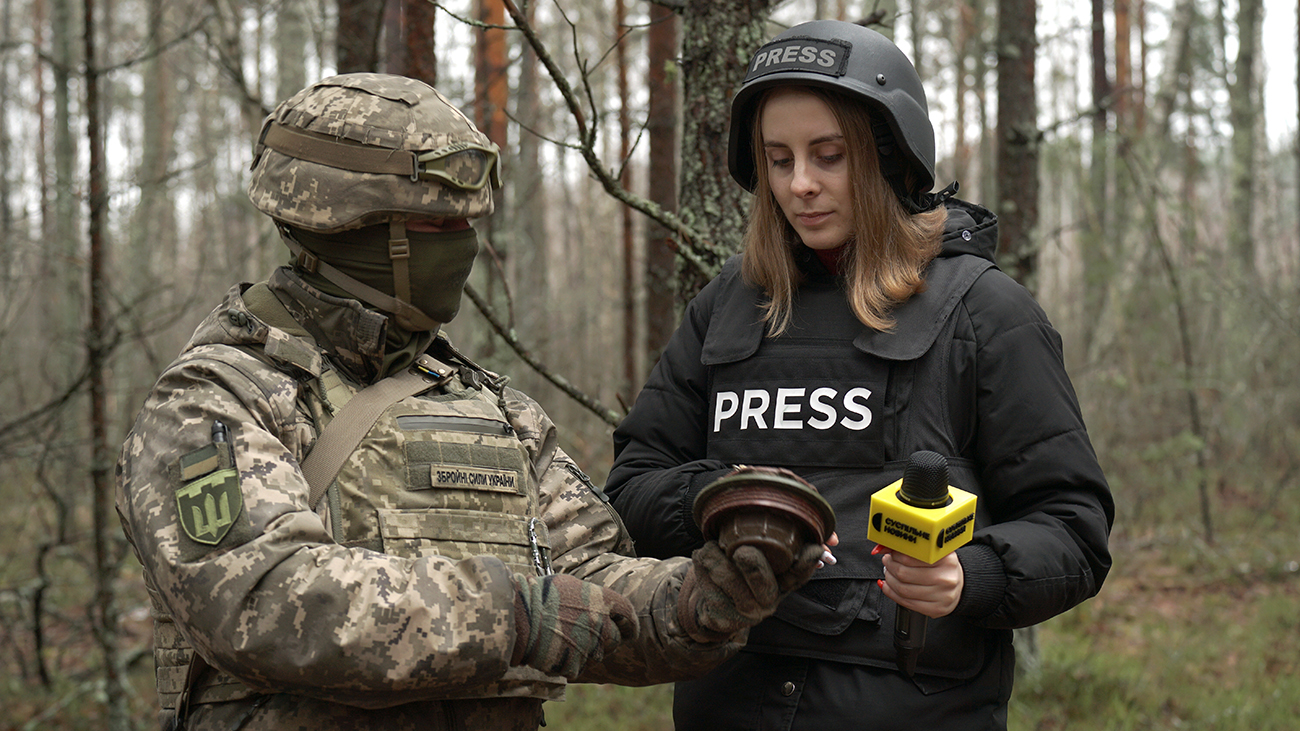Лютий 21, 2023
Дарина Коломієць, Суспільне: «Ввечері лягала на підлогу і ридала, а вранці вставала, одягаючи маску непорушності»
Суспільне Мовлення продовжує цикл блогів, розпочатий 16 лютого, у День військового журналіста, в яких наші кореспонденти діляться своїм досвідом роботи у найгарячіших місцях українського спротиву.
Читайте також: Олександра Новосел, Суспільне Харків: «Бачу життя, попри війну»
Дарина Коломієць — кореспондентка Суспільне Новини. З перших днів повномасштабного вторгнення висвітлювала події на Київщині. Згодом почала їздити до лінії фронту в інші області, зокрема на Донбас.
 Вперше задумалася, щоб стати воєнкором, під час боїв за Іловайськ
Вперше задумалася, щоб стати воєнкором, під час боїв за Іловайськ
Я не можу сказати, що я на 100% воєнкор. Для мене це щось велике — ті, хто весь час «на війні». Я ж їду туди і повертаюся до Києва, потім знову їду — знову повертаюся. Але зупинитися не можу. Точніше, не хочу.
Коли мені було чотирнадцять, росія вперше у 2014 році напала на Україну. Пам’ятаю, як ревіла перед екраном телевізора кілька годин. Я просто не могла встати з підлоги. Ридаючи, я запитувала всесвіт, чому вся планета мовчить? Тоді й згодом я все частіше й частіше задумувалася, що найбільше, чого я хочу, — щоб війну показували і про неї говорили. Мова не тільки про Україну. Я просто розуміла, що про війну не можна мовчати.
Проте з різних причин, які залежали не від мене, воєнкором я стала тільки через вісім років.
 Тероборона подарувала мені мій перший бронежилет
Тероборона подарувала мені мій перший бронежилет
24 лютого о 5-ій ранку мої вікна затряслися від вибухів — це був найстрашніший будильник в моєму житті. За пів години в редакції на Хрещатику зібралася резервна група, яку створили для роботи в разі можливих провокацій з боку росії. Мене здивувало, що я не охоплювалася панікою. Звичайно, була тривога, був страх, але я намагалася триматися спокійно. Потім президент оголосив про запровадження воєнного стану, на той час я вже знімала ситуацію у столиці біля будинку профспілок. Тоді ж уперше в житті почула сигнал повітряної тривоги. Це було о 7:04. Вже після цього емоції почали брати верх.
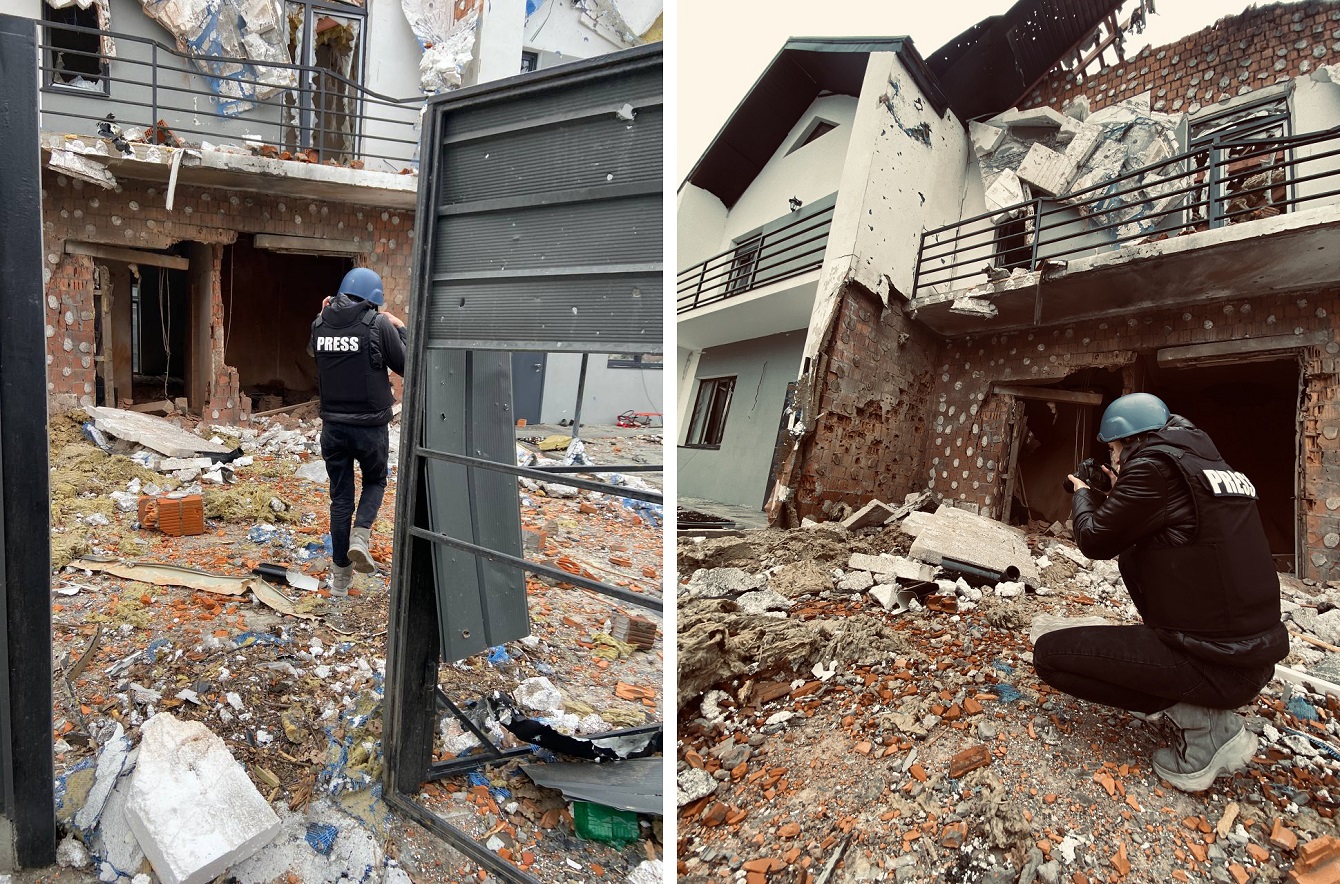
Наступна зйомка відбулася лише у березні, коли отримала акредитацію від Міністерства оборони. Наступного дня пішла знімати на свій айфон сюжет про те, як живе столиця в умовах війни. Тоді нам казали, аби ми не ризикували життям. Я прийшла додому, написала редакторці з ТБ Дарині Феденко, й вона не сварила мене, як я очікувала, а забрала мій сюжет собі у випуск. Тож після того я нарешті почала знову їздити на зйомки.
Спершу їздила з нашою директоркою департаменту Ірою Жуковською. Ми знімали у столиці та області. Згодом, приблизно з кінця березня, почала їздити самостійно — просилася скрізь з територіальною обороною — 114-ою бригадою. Брала свою камеру і петлю, які лежали «без діла» кілька років, й вирушала. Трешово було, бо майже всі виїзди були в Ірпінь, Бучу та Гостомель, а це правий берег Києва. На початку повномасштабного вторгнення дістатися з одного берега Дніпра на інший було за важкістю приблизно, як зараз доїхати до мого рідного Шаргороду на Вінниччині. Попри це, все відбувалося максимально оперативно і чітко продумано.
 Журналіст не завжди має право показувати свої емоції, але так само не завжди їх можна стримати
Журналіст не завжди має право показувати свої емоції, але так само не завжди їх можна стримати
Робота журналіста — це про відповідальність, бо кожну твою помилку бачать тисячі, сотні тисяч, а іноді й мільйони людей. Та під час війни — це про велику відповідальність, бо ти усвідомлюєш, що твоя робота може навіть врятувати комусь життя. Я безліч разів чула фразу, що журналістика — це четверта гілка влади. Ось зараз вона актуальна як ніколи.
Морально найважчі зйомки за рік війни й загалом за все життя були на Київщині у квітні 2022 року — одразу після того, як російські війська відступили. Я ніколи в житті не забуду замучених і вбитих людей, чиї тіла лежали просто на дорозі у Бучі. Й коли ти дивишся в очі жінці, яка поруч із церквою чекає, чи дістануть із братської могили тіло її чоловіка… Це як окрема папка зі спогадами в моєму мозку.
Щоранку я прокидалася і їхала знімати цей жах. Вночі поверталася, лягала на підлогу в пустій кімнаті і плакала впродовж кількох годин. Вранці знову прокидалася, натягувала на обличчя маску непорушності і їхала туди ж.
 Дуже важливо дотримуватися вказівок військових
Дуже важливо дотримуватися вказівок військових
Перше відрядження «кудись далі» було у вересні, коли Суспільне запустило проєкт, в якому ми показували, як працюють рятувальники на лінії фронту. Ми вирушили на Харківщину, згодом на Донеччину та на кордон між Дніпропетровською й Запорізькою областями. Саме так розпочалися мої поїздки на Донбас. Улюблена з яких — Новий рік з артилеристами на Бахмутському напрямку, коли рівно в 00:00 хлопці з 10-ї окремої гірсько-штурмової бригади (тиждень тому президент надав їм почесну назву «Едельвейси») обстріляли місце збору окупантів. Щоправда, майже відразу росіяни дали відповідь, проте ми встигли поїхати.
Та все ж мова зараз не про наші уподобання. Важливо розуміти, що війна — це не іграшки. З тобою завжди мають бути необхідні речі: звичайно ж бронежилет, каска і аптечка, також їжа, спальний мішок і каримат, ножі, ліхтарики. Не варто, звичайно, думати, що твоя поїздка в зону бойових дій може стати останньою. Проте й не варто лізти туди, куди тобі сказали не лізти. Що б не відбувалося навколо, завжди варто пам'ятати — жоден матеріал не вартий твого життя.
P.S. А ще, якщо будете їхати в зону бойових дій, прихопіть із собою ласощі. Там досі дуже багато діток та й загалом людей, яких вам захочеться пригостити. І, звичайно ж, наших ГЕРОЇВ!
Фото — з особистого архіву Дарини Коломієць
До публікації матеріал підготувала Юлія Лихенко
Daryna Kolomiiets, Suspilne: “In the evening I would lie on the floor and cry, and in the morning I would get up, putting on a mask of inviolability”
Suspilne Ukraine continues the series of blogs launched on 16 February, the Day of the Military Journalist, in which our correspondents share their experience of working in the hottest spots of the Ukrainian resistance.
Read also: Oleksandra Novosel, Suspilne Kharkiv: “I see life despite the war”
Daryna Kolomiiets is a correspondent for Suspilne News. From the first days of the full-scale invasion, she covered the events in Kyiv region. Later, she began traveling to the front line in other regions, including Donbas.
 I first thought about becoming a military journalist during the battles for Ilovaisk
I first thought about becoming a military journalist during the battles for Ilovaisk
I can't say that I am 100% a military journalist. For me, it's something huge - those who are always “at war”. I go there and come back to Kyiv, then I go again and come back again. But I can't stop. Or rather, I don't want to.
When I was fourteen, russia attacked Ukraine for the first time in 2014. I remember crying in front of the TV screen for several hours. I just couldn't get up from the floor. Sobbing, I asked the universe why the whole planet was silent. Then and later, I thought more and more often that what I wanted most was for the war to be shown and talked about. It's not just about Ukraine. I just realized that the war should not be kept silent.
However, for various reasons beyond my control, I became a military journalist only eight years later.
 Territorial Defense Unit gave me my first bulletproof vest
Territorial Defense Unit gave me my first bulletproof vest
On 24 February, at 5 a.m., my windows shook with explosions - it was the most terrifying alarm clock in my life. Half an hour later, a reserve group gathered at the Khreshchatyk editorial office to work in case of possible provocations from russia. I was surprised that I did not panic. Of course, there was anxiety, there was fear, but I tried to stay calm. Then the President announced the introduction of martial law, and by that time I was already filming the situation in the capital near the Trade Union Building. That's when I heard the air raid warning for the first time in my life. It was at 7:04. After that, emotions began to take over.

The next shooting took place only in March, when I received accreditation from the Ministry of Defense. The next day, I went to shoot a story on my iPhone about how the capital lives during the war. Back then, we were told not to risk our lives. I came home, wrote to the TV editor Daryna Fedenko, and she didn't scold me, as I expected, but took my story to her programme. So after that, I finally started shooting again.
At first, I traveled with our department director Ira Zhukovska. We filmed in the capital and the region. Later, around the end of March, I started traveling on my own - I asked to go everywhere with the 114th Brigade, the Territorial Defense Unit. I would take my camera and a lavalier microphone, which had been lying around for several years, and set off. It was terrible because almost all the trips were to Irpin, Bucha, and Hostomel, which is the right bank of Kyiv. At the beginning of the full-scale invasion, getting from one bank of the Dnipro to the other was about as difficult as getting to my native Sharhorod in Vinnytsia region. Nevertheless, everything was done as quickly as possible and well thought out.
 A journalist does not always have the right to show his emotions, but it is also not always possible to restrain them
A journalist does not always have the right to show his emotions, but it is also not always possible to restrain them
The work of a journalist is about responsibility, because every mistake you make is seen by thousands, hundreds of thousands, and sometimes millions of people. But in times of war, it is a great responsibility, because you realize that your work can even save someone's life. I've heard the phrase many times that journalism is the fourth branch of government. Now it is more relevant than ever.
Morally, the most difficult shootings during the year of war and in my entire life took place in Kyiv region in April 2022, right after the russian troops retreated. I will never in my life forget the tortured and killed people whose bodies were lying on the road in Bucha. And when you look into the eyes of a woman who is waiting next to the church for her husband's body to be taken out of the mass grave... It's like a separate folder of memories in my brain.
Every morning I would wake up and go to film this horror. In the evening I would return, lie down on the floor in an empty room and cry for several hours. In the morning, I would wake up again, put on a mask of inviolability and go to the same place.
 It is very important to follow the instructions of the military
It is very important to follow the instructions of the military
The first business trip “somewhere further” was in September, when Suspilne launched a project in which we showed how rescuers work on the front line. We went to Kharkiv region, then to Donetsk region and to the border between Dnipro and Zaporizhzhia regions. This is how my trips to Donbas began. My favorite of which was the New Year's Eve with artillerymen in the Bakhmut area, when at exactly 00:00, the guys from the 10th Separate Mountain Assault Brigade (a week ago the President gave them the honorary name of "Edelweiss") fired at the occupiers' gathering place. However, the russians responded almost immediately, but we managed to leave.
Still, this is not about our preferences. It is important to understand that war is not a game. You should always have the necessary things with you: a bulletproof vest, helmet and first aid kit, food, a sleeping bag and sleeping mat, knives, flashlights. Of course, you should not think that your trip to the combat zone may be your last. However, you should not go where you were told not to go. No matter what is happening around you, you should always remember that no material is worth your life.
P.S. Also, if you are going to the war zone, take some goodies with you. There are still a lot of kids there and people you'll want to treat. And, of course, our HEROES!
Photos from the personal archive of Daryna Kolomiiets
The material was prepared for publication by Yuliia Lykhenko


